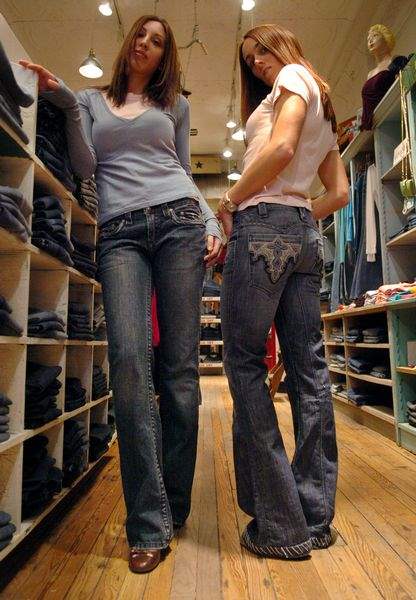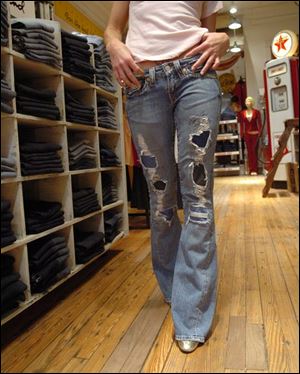
Hot pants: Pricey jeans are fashionable
1/16/2005
Stitch Navajo jeans, left, and a pair from Antik Denim both sell for $242.
Alyssa Cwanger

True Religion's Berkeley style jeans in a color called 'Destroyed' are $359.
Jeans are the prince and the pauper of American fashion.
And these days, it s all about the prince. High-priced denim pants are de rigueur, with women regularly shelling out $125 for cult brands when $50 was the designer standard 20 years ago.
Designs by Miss Sixty, 7 for all Mankind, Citizens of Humanity, Paper Denim and Cloth and dozens of other cult brands are hugely popular. Vintage Jordache and Sergio Valente styles have returned. And newer lines are selling just as well, with hand-detailed, one-of-a-kind styles by Notify, Stitches, Antik, chip & pepper, Sacred Blue and True Religion ranging as high as $300 a pair.
The mid- 70s gave birth to designer jeans, which soon become a big part of mainstream fashion. As with every style trend, it quickly attracted devotees and detractors.
Wearers claimed the new breed of denim duds was more comfortable and distinctively designed. Skeptics wondered why anybody would pay double, sometimes triple, the average price for jeans that seemed special only because Gloria Vanderbilt s or Calvin Klein s name was stitched across the derriere.
By the mid 80s, the trend had faded like an old pair of Levi s. But the higher price points didn t evaporate. Although brands such as Wrangler and Old Navy sell millions of pairs of jeans every year for under $30, dozens of brands that average $125 a pair for women are thriving, too.
Gucci designer Tom Ford catapulted couture jeans into a new dimension in 1998 when he embellished a ripped style with feathers and African beads and stuck a $3,134 price tag on them.
People bought them, igniting a jean-embellishment craze that continues today -- especially on designs for women. Embroidery, crystals and appliques have been popular in recent seasons, with turquoise, coral, tie-dye and crochet detail upping the luxe factor in current collections.

Stitch Navajo jeans, left, and a pair from Antik Denim both sell for $242.
Higher-priced materials and hand-detailing add to steep prices.
But the hunger for premium jeans is so ravenous that it s bitten off an increasingly larger chunk of a jeans industry that for women alone topped $5.5 billion in 2003.
Prices are high, high, high, high, high, said Lawrence Scott.
He should know. He owns Pittsburgh Jeans Co. on the South Side, which, since its opening in July 2001, has housed the broadest array of premium jeans in the region. I ve seen a big emergence of brand new jeans coming out at $250 and up, he said.
Mr. Scott said he s constantly mailing orders to online customers across the nation. The mailing list for the store s quarterly newsletter has reached 8,000, he said, and there are always waiting lists for several brands.
James and Moschino, two popular lines, range from $130 to $150. Fins, an exclusive line by Showroom 7 ranging from $135 to $170, is expected to fly out the door when it arrives this month, said owner Bonnie Levey.
For many women, she said, price isn't really a buying factor.
"Generally, the couture customer doesn't mind paying that for a good-fitting pair of jeans, because they know they can wear it with their designer jackets and their good shoes. These aren't market jeans."
Fashion-minded women in their 20s want to be the first to sport the newest jeans, Ms. Levey said, and they will sacrifice spending on other items to do that.
Mr. Scott at Pittsburgh Jeans observes a trend among young people away from buying many less-expensive pairs of jeans and toward buying fewer pairs at higher prices. ''They'd rather have quality and status than function. But they're not spending frivolously."
Just how much opportunity do fashion brands see in the premium denim market? Enough, Calvin Stewart believes, to sell custom-designed jeans at prices ranging from $1,000 to more than $4,000.
Stewart, a Florida-born Baby Boomer, began designing for urban streetwear and sports apparel companies but now caters to clients who want elegant, custom-fit jeans - and who don't mind paying extravagant prices for them.
His designs are beyond luxury. Working out of his Manhattan headquarters, Stewart begins with denim woven in India that costs about $40 a yard (compared to less than $3 a yard for most designer denim). To thwart counterfeiters, he sews a continuous stitch that makes it extremely difficult to determine where it begins and ends.
Then he adds specially polished and plated zippers, silk satin pockets and buttons and rivets made of silver, 14-karat white or yellow gold, platinum or diamond. The finished product, complete with a label bearing the client's name and an ID number, is shipped with an appraisal sheet and a jeweler's certificate of authenticity.
He has a waiting list that includes a New York Jets player, is in discussions with Versace about a couture denim line and plans a couture line of his own.
The major difference between today's $150 premium jeans and the $50 designer jeans of a generation ago is that the current crop is more labor-intensive. Pre-washing, vintaging and detailing are usually done by hand, justifying the inflated price.
And, thanks to the wonders of fabric technology, fits are more flattering than ever.
Even brands that have never been associated with premium denim want a piece of the action. For example, Wrangler recently teamed with Wendy Mullins of the cult denim brand Built by Wendy to design the Wrangler 47 collection, a line of jeans for men and women with prices starting at about $125.
For women, blue jeans may have become the little black dress of the 21st century. A survey for Cotton Inc. found that the average U.S. woman owns eight or nine pairs of jeans.
The Block News Alliance consists of The Blade and the Pittsburgh Post-Gazette. LaMont Jones is the Post-Gazette's fashion editor.